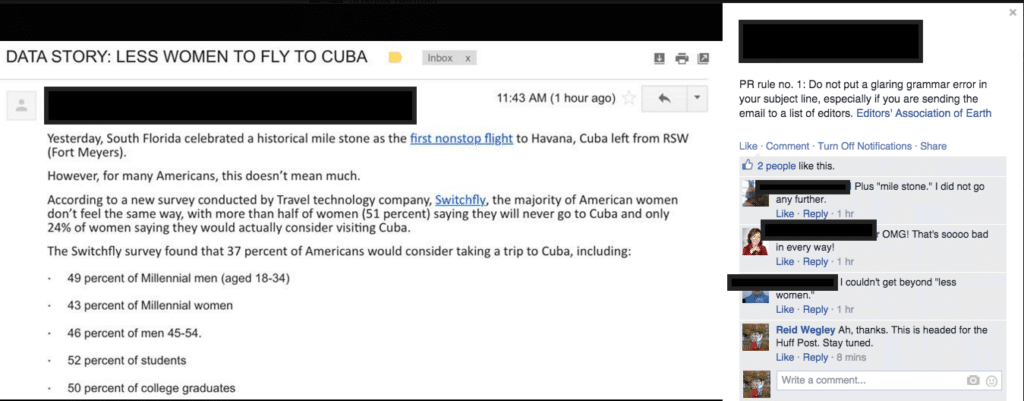Back in ‘the day’, with ‘the day’ being the establishment of the Internet, journalists began to find ways to vent their anger toward PR people. They did so in ways that were both humorous to the flacks stuck pitching those hacks, such as with the Buzzsaw Filter, and career threatening to those ID’d on an angry list, such as Chris Anderson’s infamous Black List. I had a colleague appear on that list, which was published in 2007. Haven’t spoken with him since.
Fast forward to today, and the whining about the PR community from the 4th Estate has only increased. In fact, it has gotten so bad that now even travel writers are posting bad pitches on their Facebook feeds for their journo-friends to bash en masse. Travel writers? C’mon! Is that a job or a hobby? Case in point: a writer I graduated high school with just today posted a ‘bad PR pitch’ to his Facebook page pointing out a typo in the sending flack’s subject line. So I dove in for a look. Problem was, there was no typo in the subject line, as you can see below.
There was a typo in the lead sentence of the pitch, however, which is an obvious mistake. Then again, it doesn’t appear that English was the sender’s first language, so perhaps she could be forgiven for writing ‘mile stone’ versus ‘milestone?’ The rest of the pitch was pretty good though, so at some point the finger has to wag back toward the journalist for being petty, and for potentially missing out on using some interesting data. More than half of all American women say they will never travel to Cuba? That’s way more interesting than a misdiagnosed typo! And can you still use her client’s data if you just slammed the messenger?
I call this journalist out simply because he is not seeing the forest through the trees as he has been trained to do. And trust me, this dude is not alone. In fact, writers with much greater power, influence and engagement scores have made the same mistake on Facebook. Case in point – Harry McCracken at Fast Company, formerly of TIME, PC Magazine et. al. McCracken, unlike my high school buddy, owns significant media influence, especially in the tech world. And so when he rips on a flack for a bad pitch it carries way more baggage and gets viewed by way more people – perhaps even that flack’s boss, or client.
To be honest, I really like McCracken. I read his coverage and his posts on Facebook regularly, and in doing so, discovered that his ‘bad PR pitch’ posts were misleading his Facebook fans. How? After doing the due diligence that Harry should have done, I tracked down the sources of these pitches and traced 75 percent of them to SEO firms, not PR firms. For those that don’t know, SEO is a poor man’s form of content PR – blast a pitch far and wide and then hope some entity places your client’s content.
SEO firms, at least from my experience, use a shotgun blast strategy, whereas most reputable PR firms use a sniper-like strategy. Good practitioners on either side should have the wherewithal to at least get the subject lines and salutations correct, but in many cases they don’t. Especially the SEO firms – big email blasts don’t lend themselves to accuracy by nature. Once I pointed this fact out to McCracken, his community agreed and today he is spending a lot less time focused on posting bad pitches on his feed. In fact, I haven’t seen one in months.
As with all things, once a movement reaches a certain threshold it loses its punch. Once a trend graduates from the tastemakers of the world to, say, the travel writing community, we know that trend has reached its critical mass. In television terms, journalists publicly accosting flacks for bad pitches has officially jumped the shark as an activity.


